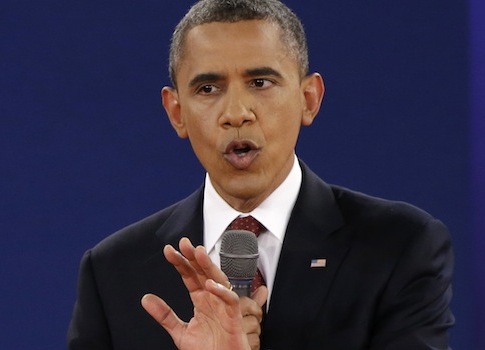President Barack Obama appears to be doubling down on his policies of using taxpayer money to finance green energy investments despite an increasingly spotty track record.
"We've got to control our own energy, you know, not only oil and natural gas, which we've been investing in, but also, we've got to make sure we're building the energy source of the future, not just thinking about next year, but 10 years from now, 20 years from now," he said during Tuesday night's presidential debate. "That's why we've invested in solar and wind and biofuels, energy-efficient cars."
The controversial stimulus package passed in 2009 allocated some $90 billion for an assortment of green energy projects in an effort to create millions of "shovel ready" jobs.
On the day of the debate, however, one of those "investments" went belly up. Battery maker A123 Systems filed for bankruptcy Tuesday despite receiving more than $250 million in taxpayer funding. The company had reported a net loss of more than $400 million over the past two years.
Obama touted A123 in July 2011 as an example of a successful taxpayer investment in green energy. "Companies like these are taking root and putting people to work in every corner of the country," he said.
The firm’s bankruptcy exemplifies how the president’s green energy policies have failed, according to one top Republican lawmaker.
"A123’s bankruptcy is a sign that the Obama administration’s green house of cards is starting to collapse," House Oversight and Investigations Subcommittee chairman Cliff Stearns (R., Fla.) told the Washington Examiner.
A123 was a business partner with Fisker Automotive, another taxpayer-financed green energy company that is struggling to survive despite receiving more that $500 million in taxpayer financing.
Fisker was forced to recall a number of its Karma electric vehicles last year due to defective batteries from A123. The company has also received criticism for manufacturing the Karma in Finland despite receiving support from United States taxpayers.
A123 is just the latest green energy company touted by Obama—and funded with taxpayer dollars—to experience financial difficulty. Earlier this year, solar panel firm Amonix Inc. laid off nearly two-thirds of its workforce after receiving a $6 million federal tax credit.
The highest profile failure in Obama’s green energy portfolio is Solyndra, the California solar company that filed for bankruptcy in September 2011. The firm, which was partially owned by prominent Obama campaign bundler George Kaiser, was the recipient of more than $500 million in taxpayer-guaranteed loans.
Kaiser can expect to see a better return on his investment than American taxpayers. As part of a 2010 agreement to restructure Solyndra’s loan, Obama’s Department of Energy granted priority status to private investors such as Kaiser with respect to the first $75 million recovered in the event of the firm’s bankruptcy—a move that many suspect may have violated federal law.
A123, Fisker, and Amonix also have ties to prominent Democratic donors. California investment guru John Doerr, who has contributed more than $170,000 to Democratic campaigns and committees since 2008, owned stakes in each of the companies through his firm Kleiner Perkins Caufield & Byers.
An early and outspoken advocate for federal investment in "green" technology, Doerr was named in 2009 to the president’s Economic Recovery Advisory Board, where he helped craft the $787 billion stimulus package. Of the 27 companies listed in KPCB’s "green-tech" portfolio, 16 received some form of taxpayer support.
This sort of relationship is par for the course when it comes to Obama’s green energy investments.
Elon Musk, who has personally donated more than $100,000 to Obama’s reelection campaign, has ties to companies that have received million of dollars in taxpayer funding over the past four years.
One of those companies, SolarCity, is currently being audited by the Internal Revenue Service and investigated by the Treasury Department’s inspector general amid allegations that the firm misrepresented the value of its investment when applying for stimulus grants.
Musk is also the CEO of and largest investor in Tesla Motors, an electric car company that received a $465 million federal loan in 2009. Steve Westly, a top Obama bundler who was appointed to a White House advisory board on energy policy, is another prominent Tesla investor.
Westly has openly acknowledged that a close relationship with federal lawmakers is key to investing in green technology. In response to a reporter’s question about which green energy companies he likes to invest in, Westly said: "Who cares what I think. Let’s talk about ‘what does Obama like? Here’s what he likes,’ because here’s where the federal government is putting money. And let me tell you, whatever he likes, that’s what I like."
